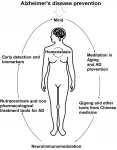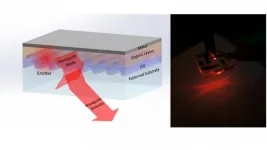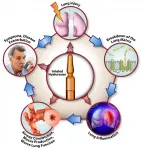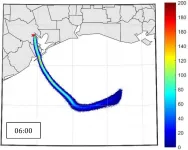(Press-News.org) As COVID-19 spread across the world, so did conspiracy theories and false information about the virus. This proliferation of misinformation--labeled an "infodemic" by the World Health Organization (WHO)--makes it difficult to identify trustworthy sources and can threaten public health by undermining confidence in science, governments, and public health recommendations.
The consequences of misinformation can be tragic: hundreds died and thousands were poisoned in Iran after consuming toxic methanol alcohol, falsely believing it could cure COVID-19.
In a new article in the Journal of Public Health Policy, legal scholars at NYU School of Global Public Health and the global health organization Vital Strategies identify five approaches countries have taken to address misinformation about COVID-19. Their tactics ranged from helpful practices like creating media campaigns sharing accurate information to harmful practices like suppressing whistleblowers and factual information, or disseminating disinformation (the intentional spread of false information) on their own. Several approaches criminalized expression, eliciting human rights concerns, given that international law protects freedom of expression.
"Governments can best address COVID-19 misinformation by disseminating factual information, protecting expression, ensuring strong protections for whistleblowers, and supporting an independent media environment," said study author Jennifer Pomeranz, assistant professor of public health policy and management at NYU School of Global Public Health.
"On top of the human rights concerns, overzealous prosecution of expression undercuts public health efforts by sowing mistrust between communities and their government," said study author Aaron Schwid, Director of Public Health Law at Vital Strategies.
To identify the range of methods governments used to address COVID-19 misinformation, the researchers conducted a content analysis of international media coverage. Using keywords including "misinformation," "disinformation," and "fake news," they analyzed hundreds of articles from February through May 2020.
The observed government actions, whether helpful or harmful, fell into five general categories:
Disseminating and increasing access to accurate information. In Taiwan, for example, the government held daily press conferences, distributed newsletters, developed media campaigns, promoted the Taiwan FactCheck Center (which rapidly verifies or debunks online information), and created "mask maps" to show where masks were available. Officials in South Africa and Nigeria worked with the popular social media platform WhatsApp to provide users with information on the virus and how to avoid infection.
Addressing commercial fraud so consumers are not led to purchase ineffective or unsafe products related to COVID-19. In the U.S., federal agencies issued warning letters to companies selling fake products, and state attorneys general brought actions against companies for violating state consumer protection acts. In the European Union, Europol seized 4.4 million units of fake pharmaceuticals and took down 2,500 links to fraudulent COVID-19 websites, marketplaces, and advertisements.
Restricting access to accurate information by refusing to release information, or preventing communication by journalists, health officials, and whistleblowers. This started in the early days of the pandemic, for example, when Chinese doctor Li Wenliang tried to warn fellow medical professionals about a novel virus and was silenced by authorities in Wuhan, and continued throughout 2020 in other countries.
Spreading misinformation or disinformation. In Madagascar, the president broadcast his support for an unproven herbal tea to cure COVID-19. President Trump was also a source of false information, suggesting that injecting disinfectant may kill the virus. "Disinformation spread by government officials is especially problematic because people generally expect governments to provide factual information," the authors write.
Criminalizing expression through prosecuting citizens and journalists under new and existing laws. For instance, Iraq's media regulator fined Reuters and suspended its license for reporting COVID-19 statistics in violation of its media broadcasting rules. In addition, emergency powers enacted in Botswana criminalized disseminating COVID-19 information that did not come from the WHO or the country's director of health services. "The criminalization of speech over the pandemic was not necessary or legitimate and undermined the right to free expression," the authors write.
The researchers stress that, in the face of a pandemic, governments should broadly protect expression and ensure a free and diverse media environment, as accurate reporting by journalists is one of the most powerful tools to reduce misinformation and disinformation. In contrast, censoring or penalizing expression can drive ideas underground, complicating efforts to correct or refute false information.
"Censorship--just like misinformation--undermines public health; both create a state of uncertainty, which motivates people to seek out information from less transparent sources," said Pomeranz.
"The solution to misinformation is for governments to embrace the freedom of expression and encourage more speech--not less--and increase their own dissemination of factual information," Schwid said.
INFORMATION:
About NYU School of Global Public Health
At the NYU School of Global Public Health (NYU GPH), we are preparing the next generation of public health pioneers with the critical thinking skills, acumen, and entrepreneurial approaches necessary to reinvent the public health paradigm. Devoted to employing a nontraditional, interdisciplinary model, NYU GPH aims to improve health worldwide through a unique blend of global public health studies, research and practice. The School is located in the heart of New York City and extends to NYU's global network on six continents. Innovation is at the core of our ambitious approach, thinking and teaching. For more, visit: http://publichealth.nyu.edu/
About Vital Strategies
Vital Strategies is a global health organization that believes every person should be protected by a strong public health system. We work with governments and civil society in 73 countries to design and implement evidence-based strategies that tackle their most pressing public health problems. Our goal is to see governments adopt promising interventions at scale as rapidly as possible. To find out more, please visit http://www.vitalstrategies.org or Twitter @VitalStrat.
The COVID-19 pandemic is straining health systems across the country, especially intensive care units. New research from the U.S. Department of Veterans Affairs, Regenstrief Institute and Indiana University School of Medicine shows that people treated in the ICU for COVID-19 are twice as likely to die when the ICU capacity is strained by the number of COVID-19 patients.
"These results demonstrate that patients with COVID-19 are more likely to die if they are admitted to an ICU during times with peak COVID-19 caseload," said Dawn Bravata, M.D., first author of the study. "We know that strain on hospital ...
Amsterdam, December 29, 2020 - This new pioneering study by Prof. Ricardo Maccioni and coworkers of the International Center for Biomedicine, "New Frontiers in the prevention, diagnosis and treatment of Alzheimer´s disease" was published in the special issue of Latin American investigators of the Journal of Alzheimer's Disease(JAD). This supports a growing body of research on the Alzheimer's prevention value of an integrated approach using daily exercise, nutraceuticals, oriental practices such as QiGong along with meditation, and social life. These elements of a healthy style of life are supplemented with the use of reliable biomarkers for early detection of this disease that allows the detection of Alzheimer up to 20 years before ...
Chronic stress could be the prevailing condition of our time. In the short term, our jaws or stomachs may clench; in the long term, stress can lead to metabolic disease and speed up diseases of aging, as well as leading to more serious psychological disorders. The physical manifestations of stress originate in the brain, and they move along a so-called "stress axis" that ends in the adrenal glands. These glands then produce the hormone cortisol. When the stress axis is continually activated, changes occur in the cells and organs along the way, and the continual production of cortisol then substantially contribute the symptoms of chronic stress.
The stress response axis starts with the hypothalamus in the brain, ...
Scientists say stable seafood consumption amongst the world's poorer coastal communities is linked to how local habitat characteristics influence fishing at different times of the year.
In the coastal communities of low-income countries, the seafood people catch themselves is often a main food source. In a new study, scientists focused on an often-overlooked type of fishing called gleaning: collecting molluscs, crabs, octopus and reef fish by hand close to shore.
"We surveyed 131 households in eight coastal communities on a small island off Timor-Leste," said study lead author Ruby Grantham from the ARC Centre of Excellence for Coral Reef Studies.
Grantham said even though gleaning is important for food security ...
(Boston)--There have been great advances in treating melanoma over the past five years, however, even with these treatments many patients quickly develop drug resistance and die from their disease. A new study from Boston University School of Medicine (BUSM) has discovered that a drug (YK-4-279) that was previously created to target one specific type of protein has much broader use against a family of proteins that act to promote melanoma.
"We find that this drug inhibited melanoma from becoming more aggressive in human cells and in experimental models. We also found a specific pathway that this drug acts through to be anti-cancer: inhibiting proteins that drive genes that promote cancer cell growth and metastasis," ...
COLUMBUS, Ohio - Antarctic ice is melting, contributing massive amounts of water to the world's seas and causing them to rise - but that melt is not as linear and consistent as scientists previously thought, a new analysis of 20 years' worth of satellite data indicates.
The analysis, built on gravitational field data from a NASA satellite system, shows that Antarctica's ice melts at different rates each year, meaning the models scientists use to predict coming sea level rise might also need adjusting.
"The ice sheet is not changing with a constant rate - it's more complicated than a linear change," said Lei Wang, assistant professor ...
Researchers from North Carolina State University and the University of Texas have developed and demonstrated a new approach for designing photonic devices. The advance allows them to control the direction and polarization of light from thin-film LEDs, paving the way for a new generation of virtual reality (VR) and augmented reality (AR) technologies.
"This is a fundamentally new device architecture for photonic devices," says Franky So, corresponding author of a paper describing the work. "And we've demonstrated that, using our approach, directional and polarized emissions from an organic LED or a perovskite LED without external optical elements can be realized." So is the ...
Researchers at the National Institutes of Health and their collaborators found that inhaling unfragmented hyaluronan improves lung function in patients suffering from severe exacerbation of chronic obstructive pulmonary disease (COPD). Hyaluronan, a sugar secreted by living tissue that acts as a scaffold for cells, is also used in cosmetics as a skin moisturizer and as a nasal spray to moisturize lung airways. Utilized as a treatment, hyaluronan shortened the amount of time COPD patients in intensive care needed breathing support, decreased their number of days in the hospital, and saved money by reducing their hospital stay.
The study, published online in Respiratory Research, is a good example of how examining the impacts of environmental pollution on the lungs can ...
Self-control significantly affects well-being and objective success in life. Although many agree that a high degree of self-control is beneficial, helping people develop more self-control is a tricky challenge. Self-control training, like training in any domain, is affected by the basic question of whether a person is motivated to improve self-control. Recent work has found that people differ as to how strongly they desire better self-control, and reveals some of the factors affecting this desire.
Desire for self-control (DSC) reflects a wish to have an improved self-control ability. This desire is influenced by societal or cultural ...
HOUSTON - (Feb. 1, 2021) - When aboveground storage tanks fail during a storm and their toxic contents spread, the threat to human health can and probably will flow downwind of the immediate area.
Rice University engineers have developed a model to quantify what could happen when a hurricane or other natural disaster causes such damage based on data gathered from the Houston Ship Channel, the largest petrochemical complex in the United States, during and after two hurricanes, Ike in 2008 and Harvey in 2017.
Pollutants like toxic organic chemicals evaporate ...




